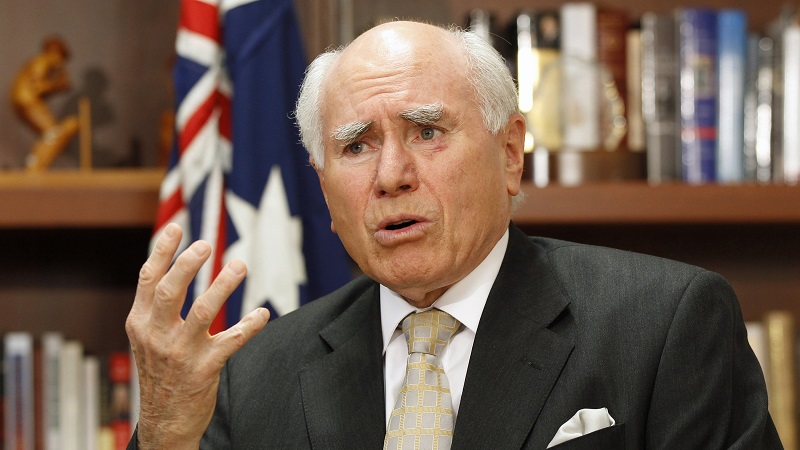John Howard on China
March 13 2017

On March 3 2017 former Australian Prime Minister John Howard addressed an audience in Sydney at the Committee for Economic Development of Australia (CEDA) annual Economic and Political Overview event.
Among other things he offered his assessment of the Australia-China and Australia-US relationships in the context of the new Trump administration.
Mr Howard said Australia’s policy toward China ‘should essentially be a continuation of what it’s been to date’, that Australia should not be forced to choose between the United States and China:[1]
I hope Australian leaders are not seduced into this stupid argument that some advance, that we’ve got to make a choice between China and the United States. I can’t think of anything more ridiculous. It’s in our interest to have close relations with both of those countries.
He said it was important for Australia to understand that ‘our role is to promote cooperation [and] avoid the siren calls of making a choice’.[2]
Mr Howard emphasised that decisions should be made based on a calculation of what is in Australia’s national interest, which may, in some instances, diverge from American interests. He cited as an example Australia’s decision in June 2015 to join the China- sponsored Asian Infrastructure Investment Bank:[3]
[W]here there’s a difference with the Americans on an issue where it’s in our interest to agree with the Chinese such as the [Asian] Infrastructure [Investment] Bank, you do it.
On the South China Sea, Mr Howard pointed to the need to ‘accept on some issues you may have tension between [the US and China]’ but that tensions could be ‘managed’ without Australia undertaking to align itself with one country over the other:[4]
For decades there was tension over the offshore islands around Taiwan, the Quemoy and Matsu islands – there was tension around those islands for decades but it didn’t come to a shooting war and you could face a long period of tension over the South China Seas which can be managed. But please…don’t have a nervous breakdown about a need to make a choice about something that may not happen.
This builds on Mr Howard’s May 5 2016 comments to the Wall Street Journal. Mr Howard suggested then that the South China Sea dispute ought to be kept in perspective, that the standoff ‘could go on for a long time without escalation’ and though ‘there could be a danger of a mistake’ the US and China have historically managed potential fallout from mistakes in a measured way.[5]
Mr Howard observed in his CEDA speech that along with other bilateral free trade agreements with South Korea and Japan, the China-Australia Free Trade Agreement ‘has been a bipartisan project’. ‘China is a priceless export market for Australia...’[6]
Mr Howard emphasised that Australia ‘must always talk down – not talk up – the possibility of conflict between [the US and China]…[W]e have to understand that China is as different from Australia when it comes to political institutions and cultural traditions as any two countries could be…[but] we have to focus on the things we have in common and not get preoccupied about the things we don’t agree on.’[7]
Mr Howard acknowledged his assessment of the triangular relationship is based on the assumption that ‘for decades into the future the United States is going to remain both economically and militarily…the most powerful country in the world’.[8]
These statements are consistent with Mr Howard’s previous remarks. On April 20 2016 in a speech to the Griffith Asia Institute he said:[9]
Those who argue that we face an inevitable choice do Australia a great disservice and fail to understand the true character of our national interest…Our goal can only be to maintain close links with both China and the United States whilst recognising that the respective partnerships will be different in character.
This fact sheet was prepared by Elena Collinson, Senior Project and Research Officer, and Simone van Nieuwenhuizen, Project and Research Support Officer, Australia-China Relations Institute, University of Technology Sydney.
Sources
[1] John Howard, Speech to the CEDA Sydney Economic and Political Overview, March 3 2017 <https://www.youtube.com/watch?v=up3Gofq27kw>.
[2] Ibid.
[3] Ibid.
[4] Ibid.
[5] David Feith, ‘China, Trump and the view from Down Under’, Wall Street Journal, May 5 2016 <http://www.wsj.com/articles/china-trum p-and-the-view-from -down-under-1462464947>. See also ACRI factsheet ‘John Howard on the South China Sea’, May 11 2016 <http://www.australiachinarelations.org/content/john-howard-south-china-sea>.
[6] John Howard, Speech to the CEDA Sydney Economic and Political Overview, March 3 2017 <https://www.youtube.com/watch?v=up3Gofq27kw>.
[7] Ibid.
[8] Ibid.
[9] John Howard, Inaugural Asia Lecture, Griffith Asia Institute, April 20 2016 <https://www.youtube.com/watch?v=dM7_YuWm2Nk>. See also ACRI factsheet ‘John Howard on the South China Sea’, May 11 2016 <http://www.australiachinarelations.org/content/john-howard-south-china-sea>.


